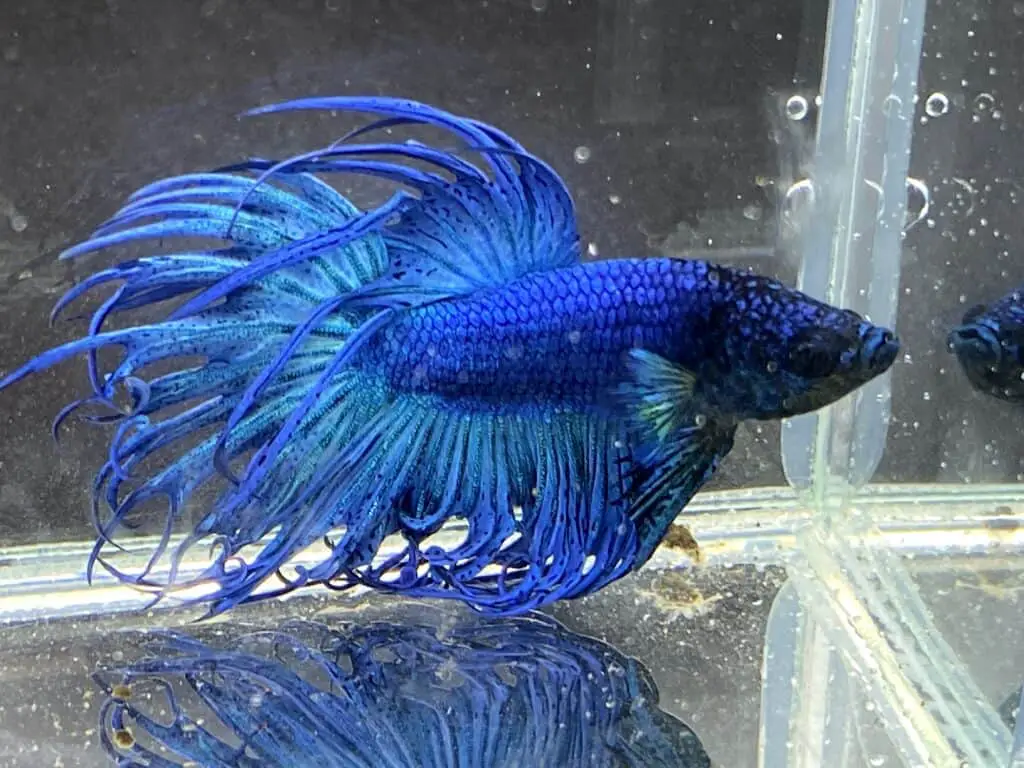Originally posted on May 23, 2023 @ 4:00 pm
Last Updated on 2 weeks by admin
Betta fish are popular pets known for their vibrant colors and unique personalities. As with any pet, it’s important to provide proper care, including a balanced diet. But, what happens if you overfeed your betta fish?
Overfeeding can lead to a variety of health problems for betta fish, including bloating, constipation, and even swim bladder disease. In this article, we’ll explore the dangers of overfeeding and provide tips on how to properly feed your betta fish for optimal health and happiness.

What Happens if You Overfeed a Betta Fish?
Betta fish, also known as Siamese fighting fish, are popular pets because of their bright colors and ease of care. But overfeeding your betta can lead to serious health problems. In this article, we will explore the consequences of overfeeding your betta fish and how to prevent it.
1. Bloated Betta Fish
Overfeeding your betta fish can cause bloating, which is a common health issue among bettas. When bettas eat too much, their digestive system cannot process the excess food, leading to bloating. The bloated stomach can put pressure on the fish’s swim bladder, causing it to lose balance and float to the surface or sink to the bottom of the tank.
To prevent bloating, feed your betta fish only the amount of food it can consume within two to three minutes. Avoid feeding your betta fish more than once or twice a day.
2. Constipation
Overfeeding can also cause constipation in betta fish. When bettas eat too much, their digestive system slows down, making it difficult for them to pass stool. The constipation can lead to loss of appetite, lethargy, and bloating.
To prevent constipation, feed your betta fish a varied diet that includes live or frozen foods, such as bloodworms or brine shrimp. These foods are high in fiber and can help your betta fish’s digestive system function properly.
3. Fin Rot
Overfeeding your betta fish can lead to fin rot, a bacterial infection that affects the fins and tail of the fish. When bettas eat too much, their immune system weakens, making them vulnerable to bacterial infections.
To prevent fin rot, feed your betta fish a balanced diet and avoid overfeeding. Also, make sure to keep the water in the tank clean and maintain a healthy environment for your fish.
4. Obesity
Overfeeding your betta fish can also lead to obesity, a common health issue among pet fish. When bettas eat too much, they gain weight, which can put pressure on their organs and lead to health problems.
To prevent obesity, feed your betta fish a balanced diet and avoid overfeeding. Also, make sure to provide your betta fish with plenty of space to swim and exercise.
5. Poor Water Quality
Overfeeding your betta fish can also lead to poor water quality, which can harm your fish’s health. When bettas eat too much, they produce more waste, which can cause the water in the tank to become dirty and cloudy.
To prevent poor water quality, feed your betta fish only the amount of food it can consume within two to three minutes. Also, make sure to clean the tank regularly and maintain a healthy environment for your fish.
6. Stress
Overfeeding your betta fish can also lead to stress, a common health issue among pet fish. When bettas eat too much, they become lethargic and lose interest in their surroundings, which can lead to stress.
To prevent stress, feed your betta fish a balanced diet and avoid overfeeding. Also, make sure to provide your betta fish with plenty of hiding places and a healthy environment.
7. Aggression
Overfeeding your betta fish can also lead to aggression, a common behavior among bettas. When bettas eat too much, they become territorial and aggressive towards other fish in the tank.
To prevent aggression, feed your betta fish a balanced diet and avoid overfeeding. Also, make sure to provide your betta fish with plenty of space and hiding places to reduce stress and aggression.
8. Death
Overfeeding your betta fish can lead to death if left untreated. When bettas eat too much, they can develop serious health issues, such as bloating, constipation, and fin rot, which can lead to death if not treated promptly.
To prevent death, feed your betta fish a balanced diet and avoid overfeeding. Also, make sure to monitor your fish’s health regularly and seek veterinary care if necessary.
9. Benefits of Feeding Your Betta Fish Properly
Feeding your betta fish properly can have many benefits, such as:
– Keeping your fish healthy and happy
– Preventing health issues, such as bloating, constipation, and fin rot
– Maintaining a clean and healthy environment for your fish
– Reducing stress and aggression in your fish
– Increasing the lifespan of your fish
10. Conclusion
In conclusion, overfeeding your betta fish can have serious consequences, such as bloating, constipation, fin rot, and even death. To prevent these health issues, feed your betta fish a balanced diet and avoid overfeeding. Also, make sure to maintain a clean and healthy environment for your fish, and monitor your fish’s health regularly. With proper care, your betta fish can live a long and healthy life.
Frequently Asked Questions
Betta fish are a popular pet due to their vibrant colors and low-maintenance care. However, it’s important to know the proper way to feed your betta fish to ensure their health and longevity. Here are some frequently asked questions about overfeeding betta fish:
What happens if you overfeed a betta fish?
Overfeeding your betta fish can lead to serious health problems, including obesity and bloating. Betta fish have small stomachs and can only eat small amounts of food at a time. If you feed your betta fish too much, they may become constipated or develop swim bladder disease, which can cause them to have difficulty swimming or even float upside down.
In addition to physical health problems, overfeeding can also lead to poor water quality in your betta fish’s tank. Excess food can break down and produce harmful toxins, which can harm your fish and other aquatic life in the tank. It’s important to feed your betta fish the right amount of food to avoid these issues.
How much should you feed a betta fish?
Betta fish should be fed small amounts of food once or twice a day. A good rule of thumb is to feed them the amount of food that they can eat in 2-3 minutes. It’s important to avoid overfeeding your fish, as they can quickly become overweight and develop health problems. If you’re not sure how much to feed your betta fish, consult with a veterinarian or experienced fish owner for guidance.
It’s also important to choose the right type of food for your betta fish. Betta fish are carnivores and require a diet that is high in protein. You can give them commercial betta fish pellets or live or frozen foods such as bloodworms or brine shrimp.
What are the signs of overfeeding a betta fish?
The signs of overfeeding a betta fish include bloating, constipation, and swim bladder disease. Bloating occurs when the fish’s stomach becomes distended due to excess food. Constipation can cause the fish to have difficulty passing waste, which can lead to further health problems. Swim bladder disease can cause the fish to have difficulty swimming or even float upside down.
If you notice any of these signs, it’s important to adjust your betta fish’s feeding schedule and amount of food. You may also need to improve the water quality in the tank by doing partial water changes and removing any excess food or waste from the tank.
How often should you clean a betta fish tank?
Betta fish tanks should be cleaned regularly to maintain good water quality for your fish. A good rule of thumb is to do a partial water change of 25-50% once a week. You should also clean the tank’s filter and remove any excess food or waste from the tank. If you notice that the water is cloudy or has a strong odor, it may be necessary to do a more thorough cleaning of the tank.
It’s important to use a mild soap or aquarium-safe cleaning solution when cleaning the tank to avoid harming your fish. Avoid using harsh chemicals or abrasive materials that can scratch the tank’s surface or damage the filter.
Can betta fish die from overfeeding?
Yes, betta fish can die from overfeeding. Overfeeding can lead to serious health problems, including obesity, bloating, and swim bladder disease, which can be fatal if left untreated. In addition, excess food can break down and produce harmful toxins, which can harm your fish and other aquatic life in the tank.
If you suspect that your betta fish is suffering from overfeeding or other health problems, it’s important to consult with a veterinarian or experienced fish owner for guidance. They can provide you with tips on how to adjust your betta fish’s feeding schedule and amount of food to ensure their health and longevity.

What to do If my Betta Fish Is Bloated? (FIX Bloated Betta Fish Problem)
In conclusion, overfeeding your betta fish can lead to serious health issues such as obesity, constipation, and even death. It is important to follow a strict feeding schedule and only provide your betta with the appropriate amount of food each day.
By avoiding overfeeding, you can ensure that your betta fish will live a long and healthy life. Remember to only feed your betta fish once or twice a day, and only give them a small amount of food each time.
Overall, taking care of a betta fish requires patience and diligence. By following the proper feeding guidelines, you can enjoy the beauty and company of your betta fish for years to come.
